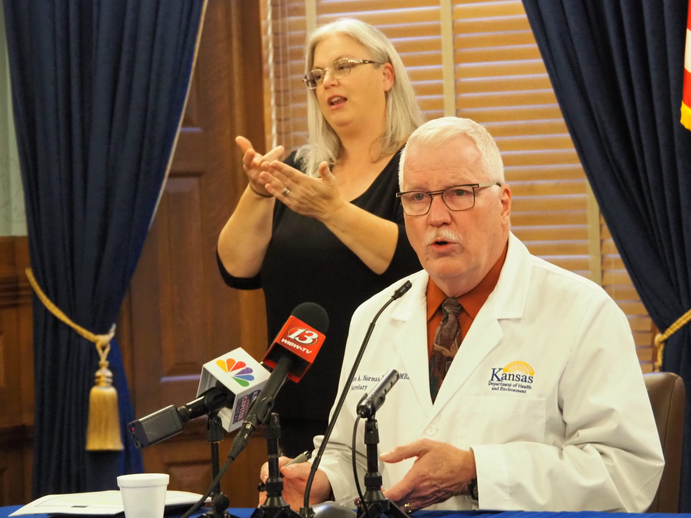
By NOAH TABORDA
Kansas Reflector
TOPEKA — Concerns are growing about adequate staffing levels and bed capacity at Kansas hospitals and nursing homes strained by rising COVID-19 cases.
Hospitals in southeast Kansas already are struggling with capacity issues. Ascension Via Christi Hospital announced this week it would implement its surge plan and cease all elective surgeries because of a spike in cases in Crawford and Bourbon counties.
Kansas Department of Health and Environment secretary Lee Norman said Tuesday most hospitals he has spoken with are staying ahead of the virus. He said as case numbers rise in a community, however, so will the strain on hospital staff.
“Staffing challenges will be the first thing that we notice as numbers get worse,” Norman said. “It’s not because the people are out with an illness or in quarantine. It’s just because there are only so many critical care practitioners — whether they are doctors, nurses or therapists — to go around.”
As flu season begins, Norman emphasized the need to keep community COVID-19 case numbers low and, in effect, keep all areas of the hospital operating at full capacity.
Norman said he has discussed surge capacity plans and the possibility of strain on staffing levels during conversations this week with hospitals and nursing homes across the state.
Physical inventory, such as dialysis machines and ventilators, is strong statewide, Norman said, and he expects hospitals to remain well-stocked. But he is advising a cautious approach to potential staffing shortfalls.
“We have to do whatever we can to push it down,” Norman said. “I think we might get pinched, which is an excellent reason, I think, to bolster up and strengthen the anti-contagion practices in every county, city and town.”
KDHE on Wednesday reported an increase in of 1,293 cases of COVID-19 since Monday, and a two-day increase of 67 deaths. That brings state totals to 69,155 cases and 838 deaths since the pandemic began in early March.
Kansas remains in the red zone for total cases per 100,000 people compared to the United States as a whole.
Norman said there is mounting evidence people could face re-infection with different strains of the virus. A woman in the Netherlands died this week after reinfection with COVID-19, although she was also fighting a rare form of cancer at the same time.
Nonfatal reinfections also has been reported in Hong Kong, Belgium and Nevada.
Norman said these reports contrast with the belief many hold that those who are infected are no longer at risk of contracting it again.
“We don’t know for sure if an immunity to the first time you had it, if it is a slightly different virus, will provide immunity the next time you are exposed,” Norman said. “Which means as a person that had it before, can they act like they won’t get it again? We don’t know the answer to that.”



